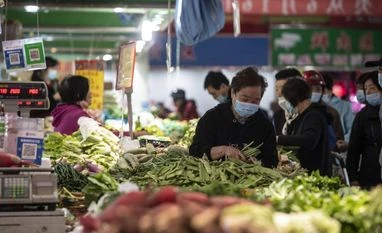China’s consumer inflation slowed in March despite a pickup in economic activity, while producer prices contracted further, leaving room for the central bank to ease monetary policy as needed to aid the recovery.
The consumer price index rose 0.7% last month from a year earlier, the National Bureau of Statistics said Tuesday, down from 1% in February and missing economists’ expectations for it to stay flat in a Bloomberg poll.
Producer prices dropped 2.5% in March, following a 1.4% decline in the previous month and in line with economists’ expectations.
Core inflation, which doesn’t include more volatile food and energy prices, climbed slightly to 0.7% from 0.6%.
More From This Section
The “economic recovery is on track but not strong enough to push up prices,” said Zhang Zhiwei, chief economist at Pinpoint Asset Management Ltd. “This suggests the economy is still running below its potential. There is room for fiscal and monetary policies to boost growth further.”
While the economy has been recovering post-Covid, the figures indicate domestic demand remains weak, giving authorities space to roll out more supportive policies to make the consumption-led rebound more sustainable. CPI has remained well below a government-set target of around 3% for the year.
Household sentiment for income and jobs has remained below pre-pandemic levels, while exports are falling and uncertainties are rife in the property market despite some improvement.
Falling car prices also contributed to the slowdown in CPI, with prices of petrol cars falling 4.5% from a year ago, NBS analyst Dong Lijuan said in a statement accompanying the data.
China’s benchmark CSI 300 Index of stocks rose 0.2% as of 10:09 a.m. local time led by consumer discretionary shares, underperforming Asian equities that gained 1%.
Speculation that policy rates may be lowered seem to “gain more traction after today’s inflation report,” said Zhou Hao, chief economist at Guotai Junan International Holdings. “By and large, the room for policy easing remains ample.”
Zhou said it will be key for policymakers to focus on the “transmission process,” adding that authorities need to guide banks to lower mortgage rates significantly to help home buyers and property developers.
The PBOC unexpectedly lowered the amount of cash banks must keep in reserve late last month, giving lenders more cash to disburse loans.
PBOC Governor Yi Gang said earlier this month that maintaining financial and currency stability, including stable prices, are the two key tasks it will keep on focusing in a move to facilitate the country’s full employment and economic growth.
The deepening in industrial deflation reflected the impact of a slump in oil prices last month and a high comparison base with a year ago, when energy costs spiked after the war in Ukraine began.
NBS analyst Dong cited those factors in the statement, though added that PPI was “stable on a monthly basis due to an acceleration in domestic economic recovery and changes in some international commodity prices.”
The falling factory prices could add further pressure on industrial companies that have seen profits plunge.
The Chinese government has been vigilant against price changes in key commodities, taking several measures this year to ensure stability. The authorities have bought pork for reserves in a bid to shore up the prices, urged futures companies not to exaggerate iron ore price increases, and are concerned about the rapid surge in sugar costs.
)